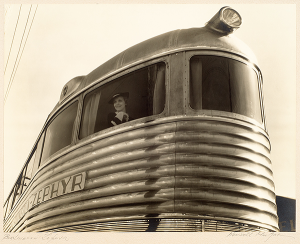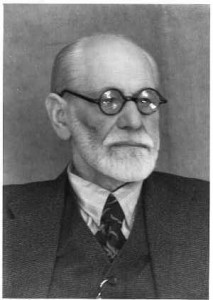Every March the campus empties out, and as the New England winter slowly gives way to spring, most students get a break before the mad dash to the end of term. But each year I am reminded of the seniors who remain behind, in the libraries or in science labs, in studios or just hiding in some quiet corner…writing, calculating, thinking, editing, and generally burning the midnight oil as they prepare senior projects.
I can’t help but think back to writing my own thesis on psychoanalysis and politics. This was one of my most important intellectual experiences, and the fact that I’m still teaching Freud in the spring (next week, in fact) points to the impact that focused research and writing can have. It may also point to my own lack of intellectual progress.
In any case… I put out a call on Twitter and also to the academic Deans to hear about the subjects on which seniors are working. This list is not representative…just a collection from those who sent me information. But look at the range of topics. Here’s what I’ve received:
Ariella Axelbank (advisor: John Finn), “The Lack of a National Theater in the United States”
Lucy Britt (Sonali Chakravarti), “Political Reconciliation and Forgiveness in Post-Genocide Rwanda”
Grace Powell (Doug Foyle), “US Drone Strikes in Pakistan and Yemen”
Chloe Rinehart (Jim McGuire), “Conditional Cash Transfers in Ecuador: Obstacles to Uptake”
Andrew Trexler (Joslyn Trager), “War Making and State Development in the Contemporary Middle East”
Jeremy Edelberg (Abigail Hornstein), “Corporate Bond Liquidity and Credit Spreads”
Mari Jarris (Ulrich Plass), “Theory, Empirics, Revolution: A Three-Dimensional Approach to Subverting Authority”
Bohao Zhou (Brian Fay), “Cosmopolitanism: A Pragmatic Attitude of Self-Growth”
Max Bigman (Jolee West, Joyce Jacobsen), “An Algorithm for Reform: The Potential Impact of Blended Learning on American Education”
Katie Deane (Studio Art),”In-Out, In-Out”
Joshua Neitzel (Francis Starr), “Stability of DNA-linked Nanoparticle Lattices”
Paul Hanakata (Francis Starr), “Unraveling the mysteries of the Polymer Thin-Film Glass Transition” (This thesis has already led to two publications!)
Peter Martin (Marty Gilmore), “Modeling and Analysis of Potential Martian Brines”
Lisle Winston (Scott Holmes), “Examining the role of histone variant H2A.Z in chromosome dynamics”
Matthew Donahue (Jill Morawski), “On Being Second Guessed by a Machine: A Reevaluation of the Bogus Pipeline”
Alec Harris (Elizabeth Willis) is writing a creative thesis that consists of poems about economics. He is an econ/English double major.
Anya Morgan (Rachel Ellis Neyra) is writing about zombies in American film and Haitian literature.
Emily Weitzman (Clifford Chase and Lisa Cohen) is writing a creative non-fiction piece about her experience with Sister Asya, a midwife, and other Muslim women in Kenya.
Aron Chilewich (Courtney Weiss Smith) is writing about the novels of Ben Lerner(not Marcus, as I had written), the much acclaimed author of contemporary experimental fiction.
Elizabeth Clayton (Kari Weil) is writing on the literary genealogy of post-traumatic stress disorder.
Taylor Steele (Amy Bloom) is writing about how food in its various states is connected to our experiences and desires.
Ethan Tischler (Mary-Jane Rubenstein),”Emptiness and Wholeness: Untangling the ‘Realities’ of Tibetan Buddhism and Quantum Physics”
Nathaniel Elmer (Architecture), “Beat Space”
In Romance Languages and Literatures I’ve head about the following:
Elle Markell is writing a thesis in Spanish about Argentinian writer César Aira.
Sarah Dash, “Guess Who’s Coming to Dinner? Fascist Ideology in the Kitchens of a Nation”
Christina Norris will produce a radio podcast in the format of “This American Life” to explore the public reception and consumption of the media portrayal of terrorism following the March 2012 terrorist attack in Toulouse, France, and the Boston Marathon tragedy a year later in April 2013.
Two more in NSB from Matt Kurtz:
Rachel Rosengard, “Comparing two methods for improving verbal memory in schizophrenia”
Rachel Olfson, “Methods for Remediation of Theory of Mind (ToM) Deficits in Schizophrenia”
Sarah Mahurin reports that Elsa Hardy (AfAm, Hispanic Studies) is writing a thesis on cross-cultural exchange between child care providers and their employers.
Sarah Sculnick (English) is writing on the urban literary regionalisms of Gwendolyn Brooks (Chicago) and August Wilson (Pittsburgh).
In General Scholarship:
Maggie Feldman-Piltch, “Enforcing the Human Rights Obligations of Organizations”
And from FGSS, certainly a contender for best title:
Ella Dawson (Robert Steele), “Girl Has Sex, World Doesn’t End: Reconceptualizing Feminist Erotica”
That’s already an impressive list, but there are lots more theses being written, drawn, and performed. I apologize for not having a more complete list, but if you are so inclined…just add titles to to comments below.




